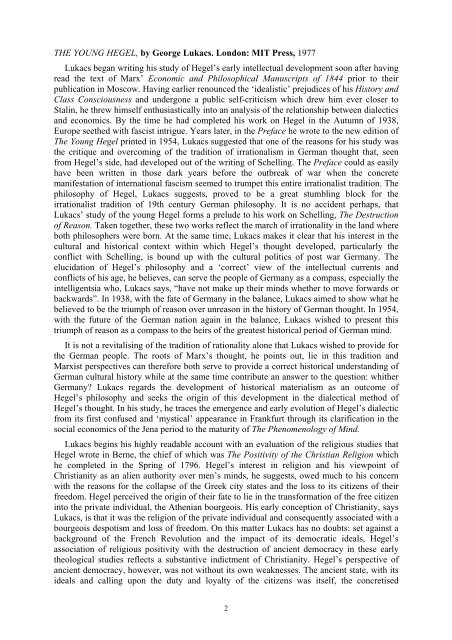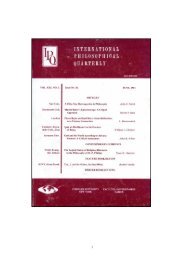The young hegel - Karl Marx Studies
The young hegel - Karl Marx Studies
The young hegel - Karl Marx Studies
Create successful ePaper yourself
Turn your PDF publications into a flip-book with our unique Google optimized e-Paper software.
THE YOUNG HEGEL, by George Lukacs. London: MIT Press, 1977<br />
Lukacs began writing his study of Hegel’s early intellectual development soon after having<br />
read the text of <strong>Marx</strong>’ Economic and Philosophical Manuscripts of 1844 prior to their<br />
publication in Moscow. Having earlier renounced the ‘idealistic’ prejudices of his History and<br />
Class Consciousness and undergone a public self-criticism which drew him ever closer to<br />
Stalin, he threw himself enthusiastically into an analysis of the relationship between dialectics<br />
and economics. By the time he had completed his work on Hegel in the Autumn of 1938,<br />
Europe seethed with fascist intrigue. Years later, in the Preface he wrote to the new edition of<br />
<strong>The</strong> Young Hegel printed in 1954, Lukacs suggested that one of the reasons for his study was<br />
the critique and overcoming of the tradition of irrationalism in German thought that, seen<br />
from Hegel’s side, had developed out of the writing of Schelling. <strong>The</strong> Preface could as easily<br />
have been written in those dark years before the outbreak of war when the concrete<br />
manifestation of international fascism seemed to trumpet this entire irrationalist tradition. <strong>The</strong><br />
philosophy of Hegel, Lukacs suggests, proved to be a great stumbling block for the<br />
irrationalist tradition of 19th century German philosophy. It is no accident perhaps, that<br />
Lukacs’ study of the <strong>young</strong> Hegel forms a prelude to his work on Schelling, <strong>The</strong> Destruction<br />
of Reason. Taken together, these two works reflect the march of irrationality in the land where<br />
both philosophers were born. At the same time, Lukacs makes it clear that his interest in the<br />
cultural and historical context within which Hegel’s thought developed, particularly the<br />
conflict with Schelling, is bound up with the cultural politics of post war Germany. <strong>The</strong><br />
elucidation of Hegel’s philosophy and a ‘correct’ view of the intellectual currents and<br />
conflicts of his age, he believes, can serve the people of Germany as a compass, especially the<br />
intelligentsia who, Lukacs says, “have not make up their minds whether to move forwards or<br />
backwards”. In 1938, with the fate of Germany in the balance, Lukacs aimed to show what he<br />
believed to be the triumph of reason over unreason in the history of German thought. In 1954,<br />
with the future of the German nation again in the balance, Lukacs wished to present this<br />
triumph of reason as a compass to the heirs of the greatest historical period of German mind.<br />
It is not a revitalising of the tradition of rationality alone that Lukacs wished to provide for<br />
the German people. <strong>The</strong> roots of <strong>Marx</strong>’s thought, he points out, lie in this tradition and<br />
<strong>Marx</strong>ist perspectives can therefore both serve to provide a correct historical understanding of<br />
German cultural history while at the same time contribute an answer to the question: whither<br />
Germany? Lukacs regards the development of historical materialism as an outcome of<br />
Hegel’s philosophy and seeks the origin of this development in the dialectical method of<br />
Hegel’s thought. In his study, he traces the emergence and early evolution of Hegel’s dialectic<br />
from its first confused and ‘mystical’ appearance in Frankfurt through its clarification in the<br />
social economics of the Jena period to the maturity of <strong>The</strong> Phenomenology of Mind.<br />
Lukacs begins his highly readable account with an evaluation of the religious studies that<br />
Hegel wrote in Berne, the chief of which was <strong>The</strong> Positivity of the Christian Religion which<br />
he completed in the Spring of 1796. Hegel’s interest in religion and his viewpoint of<br />
Christianity as an alien authority over men’s minds, he suggests, owed much to his concern<br />
with the reasons for the collapse of the Greek city states and the loss to its citizens of their<br />
freedom. Hegel perceived the origin of their fate to lie in the transformation of the free citizen<br />
into the private individual, the Athenian bourgeois. His early conception of Christianity, says<br />
Lukacs, is that it was the religion of the private individual and consequently associated with a<br />
bourgeois despotism and loss of freedom. On this matter Lukacs has no doubts: set against a<br />
background of the French Revolution and the impact of its democratic ideals, Hegel’s<br />
association of religious positivity with the destruction of ancient democracy in these early<br />
theological studies reflects a substantive indictment of Christianity. Hegel’s perspective of<br />
ancient democracy, however, was not without its own weaknesses. <strong>The</strong> ancient state, with its<br />
ideals and calling upon the duty and loyalty of the citizens was itself, the concretised<br />
2




